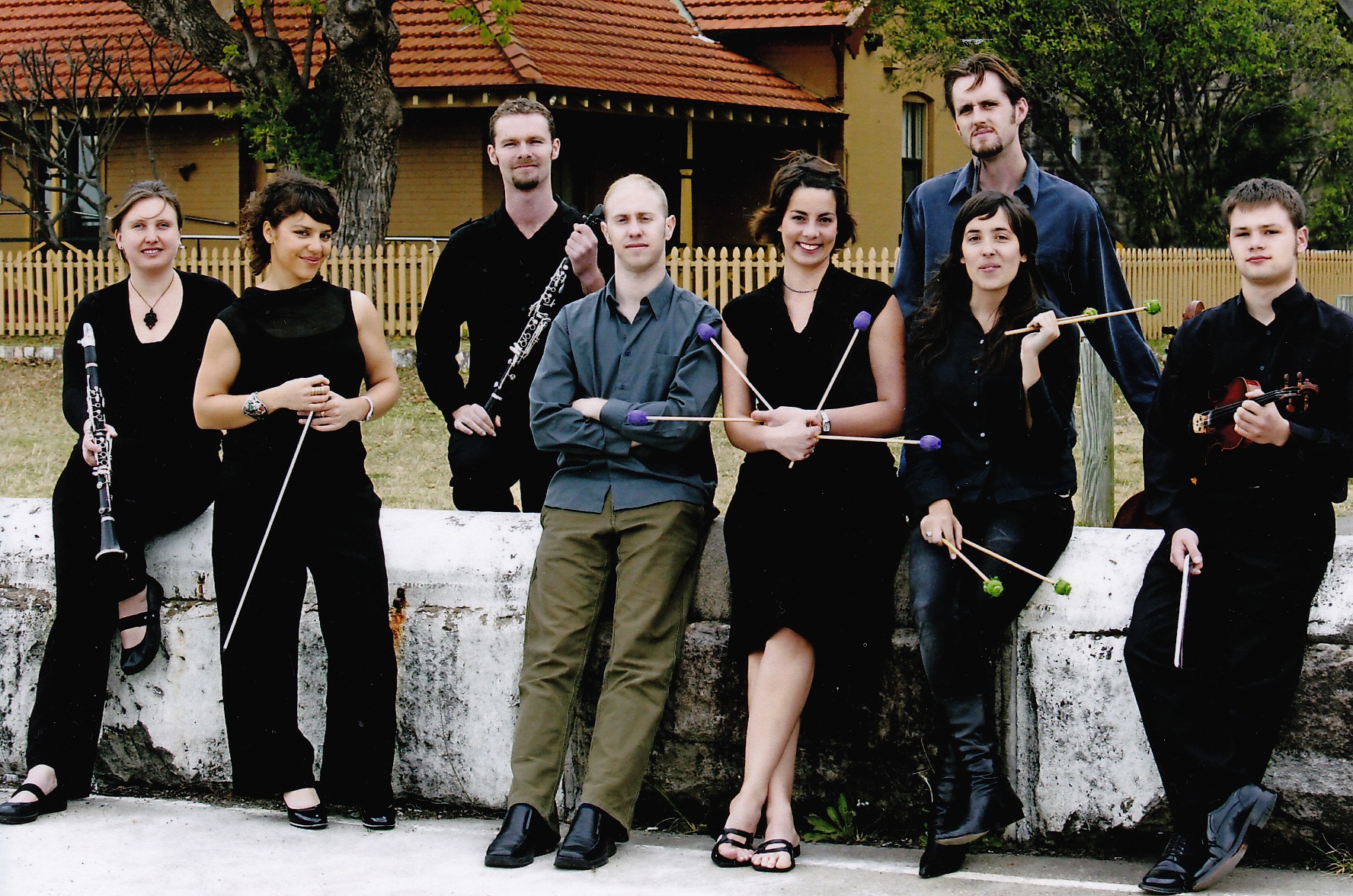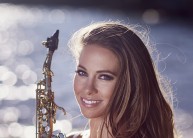Claire Edwardes On Twenty Years Of Ensemble Offspring
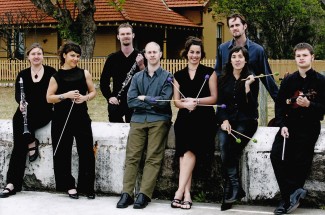
It was the year that the ANZAC bridge was opened to traffic; Telecom Australia became Telstra, Paul Keating was Prime Minister and Bob Carr defeated John Fahey to become Premier of New South Wales. Overseas, OJ Simpson was found not guilty of double murder and Braveheart won the Oscar for Best Film. The year 1995 was also the year that Ensemble Offspring was formed from “a bunch of students doing gigs for free.”
As Ensemble Offspring celebrates its 20 year anniversary this weekend, it stands at the vanguard of innovative classical music in Sydney. With their roots in classical training, the core ensemble comprises flautist Lamorna Nightingale, clarinettist Jason Noble, violinists Veronique Serret and James Cuddeford, percussionist Claire Edwardes, drummer and percussionist Bree van Reyk and pianist Zubin Kanga. Led by co-artistic directors Edwardes and Damien Ricketson, the ensemble has created and performed hundreds of new works, toured around Australia and overseas, garnered a swag of awards, collaborated with other musicians, mentored emerging musicians and pushed the boundaries of what is known as ‘classical’ music.
Speaking to SoundsLikeSydney, Claire Edwardes recalls that the first performance by Ensemble Offspring was for Roger Woodward’s 6th Sydney Spring International Festival of New Music and Visual Arts in 1995, when they performed works that Matthew Shlomowitz and Damien Ricketson had written for the performance exams of their Bachelor’s degrees.
“It was actually quite a vibrant contemporary music scene back then. We were not the first to play New Music in Australia. The Sydney Alpha Ensemble was doing regular concerts and so was the Seymour Group and because we premiered in the festival that specialised in contemporary music, people weren’t too shocked by what we played” she adds.
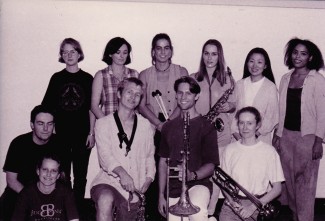
Contemporary musicians are all too aware that selling their music is not easy. A public that will embrace the latest movie, book or fashion trend will peer from behind the blinds at the latest developments in music.
Ensemble Offspring has been buoyed by an audience that was initially small but loyal and which has grown with time, responding to efforts to engage audiences beyond the mainstream. Edwardes is insightful when she observes “I guess it makes sense that people are a little bit cautious especially with music that it not tonal because it’s not what they’re use to hearing and they don’t know what to make of music that deviates from that norm.”
“We try to make our concerts really fun events” she explains. ” They’re not like a traditional classical or chamber music concerts; they’re quite light-hearted. We try to programme them so that we combine music that could be perceived as more challenging with pieces that are very engaging or theatrical or which will engage people in some other way. We speak a lot during the concert and try to draw people in by not just listening to the music because we think there is more to it than that.”
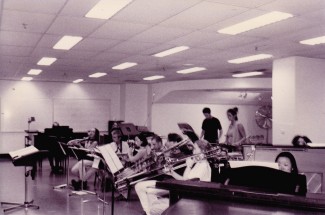
Edwardes muses that the past two decades contains almost too many highlights to mention, but relenting, nominates Fausto Romitelli’s Professor Bad Trip and performing with “hero” Mike Patton at the 2014 Sydney Festival as standouts. “Even playing with Roger Woodward in that first year was a pretty amazing for us students to be able to do” she says, adding “….and we’re about to collaborate with Sydney Chamber Opera on one of Romitelli’s operas, called Index of Metal in November at Carriageworks.”
There are few footprints to follow on this less travelled road of contemporary classical music and the ensemble has had its share of uncertain times. Edwardes cautions “It even feels precarious at the moment, to be honest. We don’t really know what’s going to happen too far into the future. We started very precariously as we weren’t funded. As is so often the case we did gigs for free. It took about seven years to be funded by Arts NSW which was basically some project funding. From there we’ve been quite lucky in that every year we’ve had a bit more money or a bit more support. It’s a slow process – we still don’t have a home or a rehearsal space or a concert venue – there is still a long way to go, but since the start, the journey has only ever been upwards.”
As a percussionist, “New Music ” is especially important to Edwardes who ignited her career by winning the prestigious Symphony Australia Young Performers Award in 1999 after graduating from the Sydney Conservatorium of Music as Student of the Year in 1997. “The selfish reason is that percussion is a relatively new instrument and we only have repertoire written for our instruments since about the 1950s. I initially got into New Music because I didn’t want to play transcriptions for the rest of my life. Now I’m totally obsessed by New Music and my mission in life is to spread the word about how great and varied and engaging and amazing it is. You can be challenged in a sonic way that traditional classical music can’t do. And I love the fact that my mind can be engaged – it’s very broad in terms of what I might get out of the music or the acoustic experience, both as a performer and as an audience member,” she enthuses.
Yet, the descriptive “New Music” is frustrating. “Labelling what we do is difficult” she says, “We sometimes call it ‘contemporary classical music’ but it’s quite hard to explain this because what we do covers so many different styles of new music. Another way of explaining it is as ‘innovative new music’ or ‘living music’ because it’s music by living composers and people get an understanding of this when they see a living composer and not someone who died centuries years ago – and that’s the essence of it – the collaborations are with living composers.”
Intrinsically, New Music is something of a conundrum to evaluate. It has not stood the test of time, nor have compositions been widely performed or recorded; there may only have been one performance of it – ever. Added to this, it is often not profitable to publish these works, making the manuscripts unavailable for study or further performance. Edwardes points to the fact that there are many different styles of New Music, asserting that Minimalism is one genre that has stood the test of time.” We know how to evaluate and analyse it” she argues. “Arvo Pärt, Ross Edwards, Spectral Music, Complex Music – all these different styles have been around long enough to be analysed within the industry and outside by audiences. I don’t feel that you need to put music into a box to understand it and the problem with a lot of contemporary classical music is that it can’t be put into a box and so people get a bit confused when they don’t know how to stamp it.”
“I can’t imagine that ever really changing. Even when Mozart was writing people didn’t understand his music – it’s inherent to something new.”
In the same realm of imponderables lies the question “When does New Music cease to be new?”
“We already know that the music of Steve Reich, Part and Glass has definitely stood the test of time even though they’re all still alive” says Edwardes. “Great music will endure. Of course there will be many pieces that I play in my lifetime that will drop off the repertoire and that’s necessary over the years so that what remains is the very best.”
New Music itself has not remained static since Ensemble Offspring emerged. “I think that theatrical elements to music, extending the sonic elements with movement and considering more than just how something sounds, adding video or stimulating senses in different ways – that’s definitely been a trend that’s developed over the last twenty years . We have technology to assist with this – combining electronics with instrumental music has developed markedly” says Edwardes.
Ensemble Offspring’s twentieth anniversary double bill Future Retro coming up this weekend embodies this sense of adventure. One concert looks back at the group’s history, highlighting the best of the last two decades and the other concert looks forward with five world premieres. “World premieres are a risk” confirms Edwardes. “Even we don’t know what they’re going to be like but there’s something very exciting about that for an audience because they’re part of something that no one in the world has ever heard before and that’s very special – that’s what we live for.”
Shamistha de Soysa for SoundsLikeSydney©

